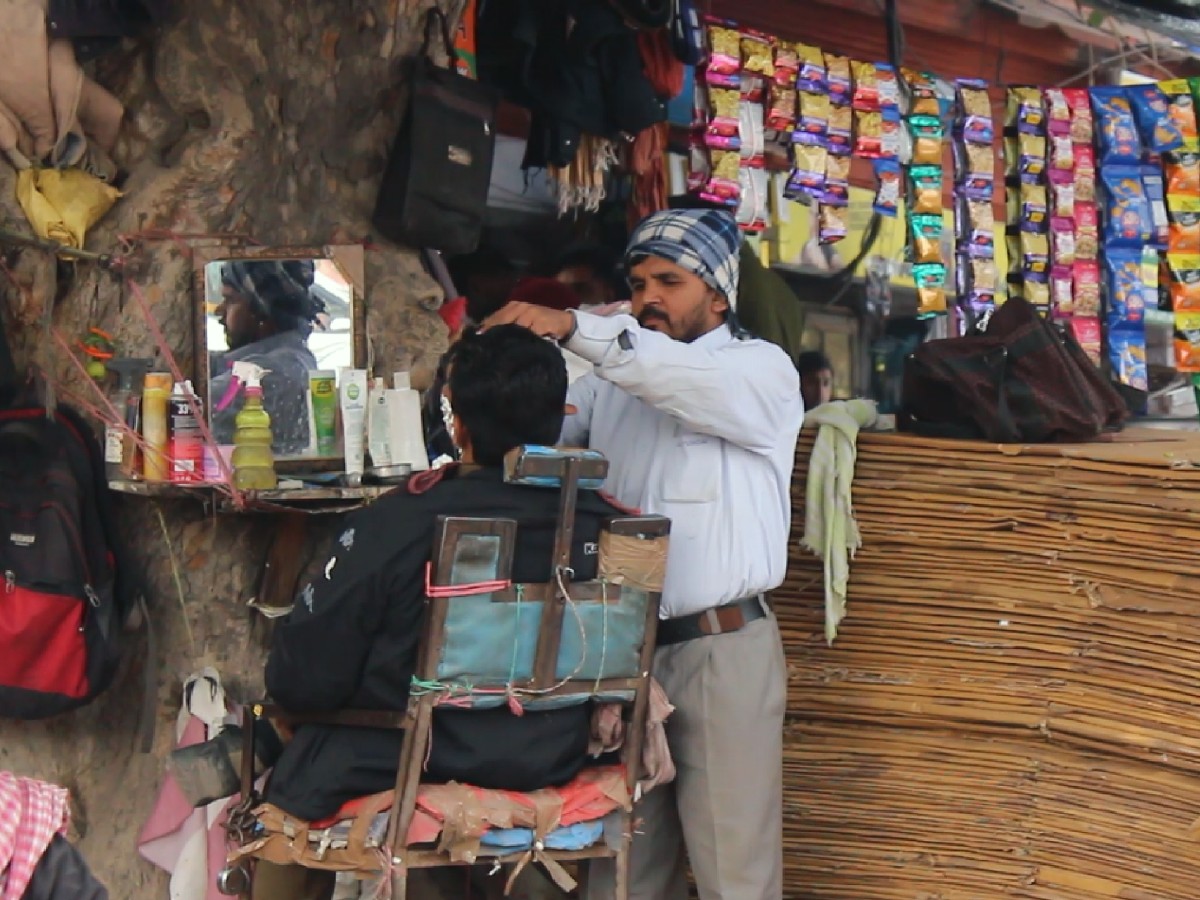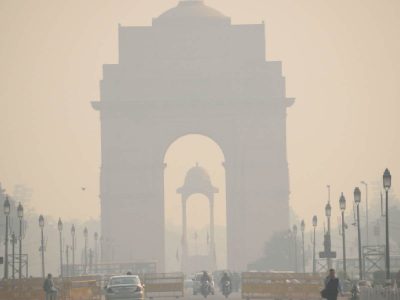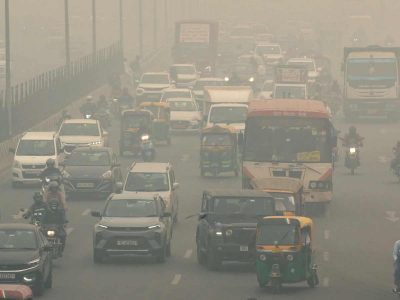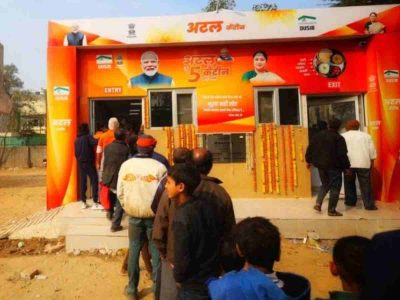At a time when inflation and price rise is pinching most people, a haircut and shave together for Rs 50 should be in huge demand and lead the barbers, charging such low prices, to economies of scale.
But the reality is far from ideal as Capital’s roadside barbers, offering their services dirt cheap, are struggling to make end meets while the salons continue to be thronged by Delhiites willing to pay at least five times the price for comfort, luxury and frills.
Meet Abhishek, working at his makeshift roadside salon amid the hustle and bustle of old Delhi’s Chandni Chowk market.
Aside from the misty and shiver-inducing winter, he also has to deal with dust and smoke from cars, which force him to clean his mirror constantly.
“I came here 25 years ago in search of better living. Initially, I started working in a small salon. That was back in the 90s.I quit my job after three years and started my own business,” he recalls.
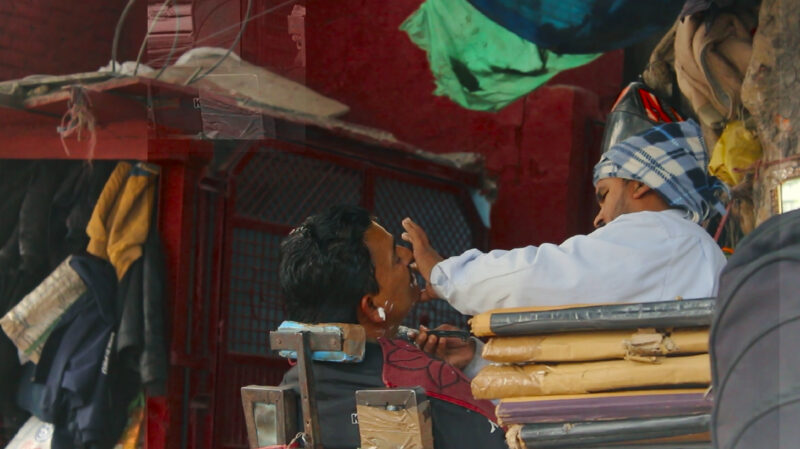
“Earlier, there was good income. I could also save quite a bit of money. But the trend seems to have changed as people have started going to big salons. The onslaught of inflation has worried us further,” says Abhishek.
Abhishek hails from Bihar and lives with his wife and two children in a rented place in Paharganj, which is a couple of kilometres away from his place of work.
Despite the hardships, Abhishek continues to strive and hopes to provide a better life and platform for his kids.
“My dream is to give a better life to my children. I want to make them doctors. I have always taught them to help people in hard times,” says Abhishek, who endured a tough time during the Covid lockdown.
“During the lockdown, we faced a tough time. I remember I tested positive for Covid and no one came to help me and my family. We were in a bad state at that time and our financial condition was really bad. But I want my children to become doctors so that they can treat the needy people free of cost in times of difficulty,” he adds.
Ranjit, who came to Delhi from Bihar 15 years ago, tends to his customers on a chair that he has placed near Khanna cinema in Paharganj, close to the New Delhi Railway Station.
The 38-year-old was forced to become a barber after he lost his job. But even this work, although his own, isn’t paying all the bills.
“When I came to Delhi, I started working in a firm as a driller. However, due to my son’s illness, I couldn’t manage to go to work regularly and was eventually fired from the job. Then I started my own venture,” he explains his ordeal.
“Initially, I could not find a place where I could keep the chair and the mirror. There is no permanent place here either. We have come here from villages only to earn better. But it is difficult to live in such a big city in this era of inflation. I am earning just enough to feed my family,” laments Ranjit.
For many Delhiites, these barbers don’t just offer services at cheap and affordable prices. They also act as agony aunt.
Arun, a 38-year-old, is a regular at a roadside salon in Karol Bagh where he also resides.
“The friendly neighbourhood barber also acts as a psychiatrist for the average Indian. Regardless of the lack of privacy, we pour our heart out to the barber. It’s a two-for-one deal in reality,” says Arun.
Visiting a barber’s stall is also a way of relaxation for him.
“I visit this roadside barber shop every afternoon and sit there until about 5 p.m. reading newspapers, listening to old songs on the radio and watching the world go by,” he explains.
The owner of the stall he visits is a 48-year-old migrant from Uttar Pradesh, Kapil Dev, who has been living in Delhi since he was eight.
Dev had migrated to the Capital 40 years ago and currently stays in Karol Bagh with his wife, two sons and grandchildren.
He recalls the time when he started working as roadside barber in Karol Bagh.
“Back then, this place wasn’t crowded as much as it is now. At that time, I used to earn well because people were down-to-earth, polite and didn’t have inhibitions visiting us. We weren’t called roadside barbers. We were simply known as barbers and people used to come here for haircut and shave. But now times have changed,” he says nostalgically.
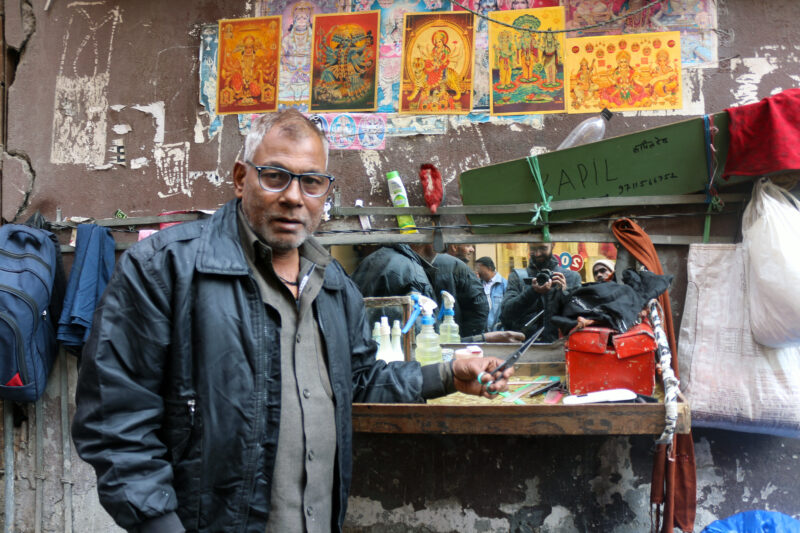
He can’t think of owning a salon in the area now as being one of the prime markets of Delhi, it is extremely expensive.
“This industry is growing fast and people are making a lot of profit out of it. However, starting a salon now needs huge investment. Nowadays, rich people have shaped salons as luxurious suites, and barbers like us are just struggling to survive,” he says.
While Dev has been around for a long time and gradually became aware of the harsh realities that the growing Capital ushered in, 34-year-old Ajay has been one of the recent migrants and didn’t have the luxury to ease into difficulties. He has been living a struggling life right from the outset.
“It’s my passion to groom people, I am good with my art, I came to Delhi with big dreams but then I faced the harsh reality of life. The real world is far different from our imaginary world,” says Ajay, who came to Delhi from Hardoi.
“In my village, people used to call me Billu Barber (on the role played by late cine star Irrfan Khan in the Hindi movie by the same name). They used to say I have magic in my hands, but when I came here searching for greener pastures, I faced disappointment. Look here, I am struggling to survive,” he says remorsefully.
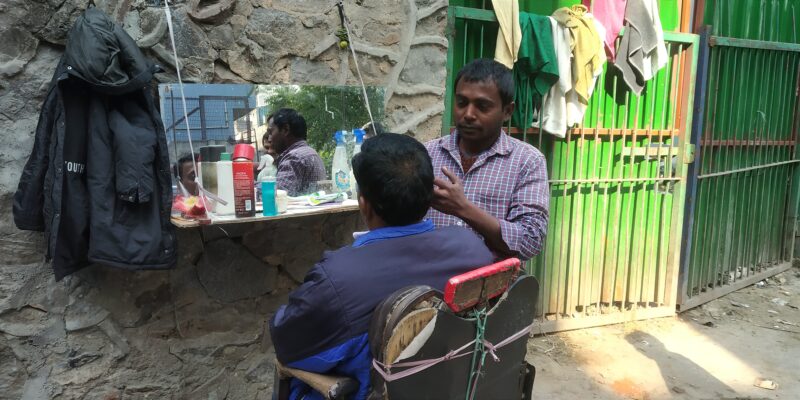
“Mostly, it is the migrant workers, day labourers, who are my customers. The rest of them go to big salons for grooming,” adds Ajay.
He is, however, unfazed and full of hope.
“I have a dream of owning a large salon of my own oneday.”
Ramprasad, who runs a temporary barber shop in Karol Bagh, says he doesn’t want his kids to follow his profession due to the difficulties involved.
“I don’t want my children to pursue this, because it has no future, no respect. Log humein sirf rastay ka naaee bulatay hain aur mazaak bana dete hai. Bade bade jo salon hotay hain unko hairdresser kehtay hain aur unki izzat bhi hoti hai (People call us petty barbers and make fun of us. Those owning and working in big salons are called hairdressers, they are respected),” he says in agony.
“During the lockdown, our work was affected badly. Despite things returning to normal now, things aren’t looking good. Only daily wagers are turning in. They can’t pay much and don’t go beyond a simple haircut or a shave. We are barely subsisting,” he says.
Kamal Khan, who works with a table and chair in Batla House, was forced to migrate from Bihar due to fewer opportunities.
“If there were more opportunities in Bihar, I would have stayed back and not left my children and wife behind,” he says.
“Every month, I send Rs 2,000-3,000 to ensure their survival. It is inadequate, but I have no choice and have to continue working. Nothing happens without money. One day, I hope to open my own salon. I’ll build it with my own blood and sweat,” he says with determination.
At a luxurious salon in nearby New Friends Colony, the staff seems to have its plate full.
The manager of the salon, who doesn’t wish to be named, said that people nowadays go for quality in grooming and are willing to shell out money.
“All the people working here are trained. Nowadays, people are investing more in this industry. The work is regular and it has its benefits. In fact, our salon thrived post Covid lockdown,” he says.
“People will pay if they know they’re getting quality. That’s why we have foreign salon brands coming into India and charging huge prices,” reasons the manager.
Rajesh Pandey, 37, who is a migrant from Uttar Pradesh’s Prayagraj and lives with his family in Harola, Noida, himself prefers roadside barbers instead of salons.
“People, especially the youngsters, flock to big salons irrespective of their economic status. They are attracted to the luxury there. You basically need a haircut which roadside shops can also provide and just for a fraction of money. In salons, they charge a huge amount. These roadside barbers can also do similar hairstyles but for a fraction of a cost,” says the auto-rickshaw driver.
Gulab Kumar, 42, moved to Delhi from Gorakhpur, Uttar Pradesh, 20 years ago looking for opportunities.
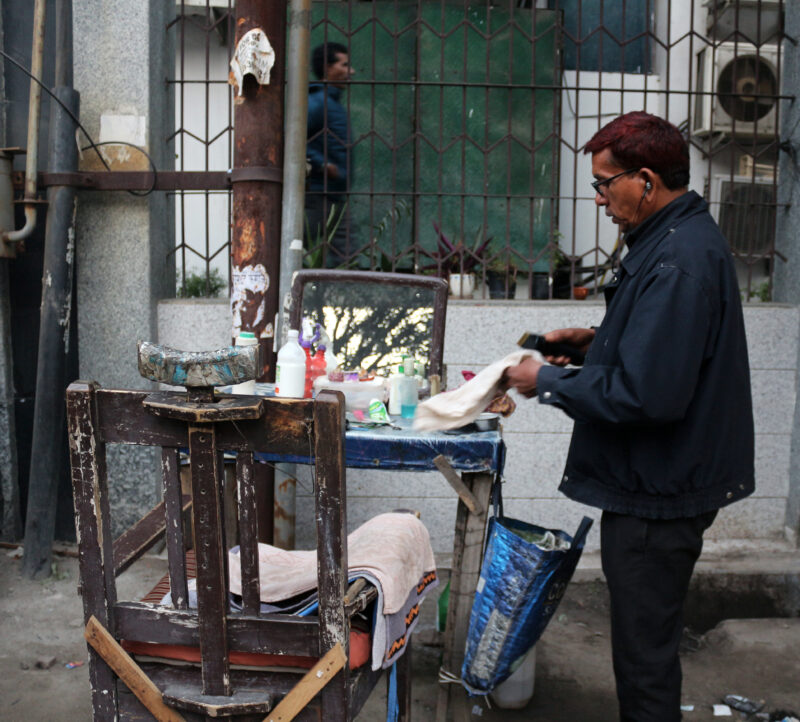
He occasionally grooms not only fellow migrants, but also locals.
“I have been doing this for more than 15 years now. I have two children, my wife and parents back in the village. I am the only breadwinner. I have a lot of responsibility but it is very difficult to survive on this work. Earlier, when I started, there used to be a queue of people but now the time has changed. People flock to salons even if they aren’t earning much. I only earn to feed my family two meals. I am unable to save,” he laments.

